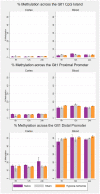Regulation of glutamate transport and neuroinflammation in a term newborn rat model of hypoxic-ischaemic brain injury
- PMID: 35615059
- PMCID: PMC9125068
- DOI: 10.1177/23982128221097568
Regulation of glutamate transport and neuroinflammation in a term newborn rat model of hypoxic-ischaemic brain injury
Abstract
In the newborn brain, moderate-severe hypoxia-ischaemia induces glutamate excitotoxicity and inflammation, possibly via dysregulation of candidate astrocytic glutamate transporter (Glt1) and pro-inflammatory cytokines (e.g. Tnfα, Il1β, Il6). Epigenetic mechanisms may mediate dysregulation. Hypotheses: (1) hypoxia-ischaemia dysregulates mRNA expression of these candidate genes; (2) expression changes in Glt1 are mediated by DNA methylation changes; and (3) methylation values in brain and blood are correlated. Seven-day-old rat pups (n = 42) were assigned to nine groups based on treatment (for each timepoint: naïve (n = 3), sham (n = 3), hypoxia-ischaemia (n = 8) and timepoint for tissue collection (6, 12 and 24 h post-hypoxia). Moderate hypoxic-ischemic brain injury was induced via ligation of the left common carotid artery followed by 100 min hypoxia (8% O2, 36°C). mRNA was quantified in cortex and hippocampus for the candidate genes, myelin (Mbp), astrocytic (Gfap) and neuronal (Map2) markers (qPCR). DNA methylation was measured for Glt1 in cortex and blood (bisulphite pyrosequencing). Hypoxia-ischaemia induced pro-inflammatory cytokine upregulation in both brain regions at 6 h. This was accompanied by gene expression changes potentially indicating onset of astrogliosis and myelin injury. There were no significant changes in expression or promoter DNA methylation of Glt1. This pilot study supports accumulating evidence that hypoxia-ischaemia causes neuroinflammation in the newborn brain and prioritises further expression and DNA methylation analyses focusing on this pathway. Epigenetic blood biomarkers may facilitate identification of high-risk newborns at birth, maximising chances of neuroprotective interventions.
Keywords: Hypoxic–ischemic encephalopathy; brain; cerebral ischaemia; glutamate; hypoxia–ischaemia; neonatal; neuroinflammation; newborn.
© The Author(s) 2022.
Conflict of interest statement
Declaration of conflicting interests: The author(s) declared no potential conflicts of interest with respect to the research, authorship and/or publication of this article.
Figures





Similar articles
-
Neuroprotective effects of a dendrimer-based glutamate carboxypeptidase inhibitor on superoxide dismutase transgenic mice after neonatal hypoxic-ischemic brain injury.Neurobiol Dis. 2021 Jan;148:105201. doi: 10.1016/j.nbd.2020.105201. Epub 2020 Nov 30. Neurobiol Dis. 2021. PMID: 33271328 Free PMC article.
-
Activation of MC1R with BMS-470539 attenuates neuroinflammation via cAMP/PKA/Nurr1 pathway after neonatal hypoxic-ischemic brain injury in rats.J Neuroinflammation. 2021 Jan 19;18(1):26. doi: 10.1186/s12974-021-02078-2. J Neuroinflammation. 2021. PMID: 33468172 Free PMC article.
-
Neuroprotective effect of the peptides ADNF-9 and NAP on hypoxic-ischemic brain injury in neonatal rats.Brain Res. 2006 Oct 18;1115(1):169-78. doi: 10.1016/j.brainres.2006.07.114. Epub 2006 Aug 30. Brain Res. 2006. PMID: 16938277
-
Hypothermia Does Not Reverse Cellular Responses Caused by Lipopolysaccharide in Neonatal Hypoxic-Ischaemic Brain Injury.Dev Neurosci. 2015;37(4-5):390-7. doi: 10.1159/000430860. Epub 2015 Jun 12. Dev Neurosci. 2015. PMID: 26087775
-
Intervention strategies for neonatal hypoxic-ischemic cerebral injury.Clin Ther. 2006 Sep;28(9):1353-65. doi: 10.1016/j.clinthera.2006.09.005. Clin Ther. 2006. PMID: 17062309 Review.
Cited by
-
Discrimination of blood metabolomics profiles in neonates with idiopathic polyhydramnios.Eur J Pediatr. 2023 Nov;182(11):5015-5024. doi: 10.1007/s00431-023-05171-1. Epub 2023 Aug 30. Eur J Pediatr. 2023. PMID: 37644170
-
Chokehold with 'rear naked choke' and delayed post-hypoxic leukoencephalopathy: a new form of assault in Mexico City.Acta Neurochir (Wien). 2025 Jul 19;167(1):195. doi: 10.1007/s00701-025-06601-9. Acta Neurochir (Wien). 2025. PMID: 40681753 Free PMC article.
References
-
- Aden U, Favrais G, Plaisant F, et al.. (2010). Systemic inflammation sensitizes the neonatal brain to excitotoxicity through a pro-/anti-inflammatory imbalance: Key role of TNFalpha pathway and protection by etanercept. Brain, Behavior, and Immunity 24(5): 747–758. - PubMed
-
- Algra SO, Groeneveld KM, Schadenberg AW, et al.. (2013) Cerebral ischemia initiates an immediate innate immune response in neonates during cardiac surgery. Journal of Neuroinflammation 10: 24. https://jneuroinflammation.biomedcentral.com/track/pdf/10.1186/1742-2094... - DOI - PMC - PubMed
-
- Azzopardi DV, Strohm B, Edwards AD, et al.. (2009) Moderate hypothermia to treat perinatal asphyxial encephalopathy. New England Journal of Medicine 361(14): 1349–1358. - PubMed
LinkOut - more resources
Full Text Sources
Miscellaneous

